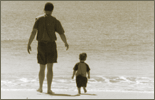  Thursday, June 5, 2008 Thursday, June 5, 2008 When They Call
When They Call
  Wednesday, April 9, 2008 Wednesday, April 9, 2008 The City Where Nobody Smiles
The City Where Nobody Smiles
  Friday, March 14, 2008 Friday, March 14, 2008 Sound Familiar?
Sound Familiar?
  Tuesday, September 4, 2007 Tuesday, September 4, 2007 Small Places
Small Places
  Wednesday, August 29, 2007 Wednesday, August 29, 2007 Dormez-Vous?
Dormez-Vous?
  Tuesday, August 28, 2007 Tuesday, August 28, 2007 The Nightmares
The Nightmares
  Friday, July 13, 2007 Friday, July 13, 2007 Jesus Wept
Jesus Wept
  Tuesday, July 10, 2007 Tuesday, July 10, 2007 Sickness and Health
Sickness and Health
  Monday, July 9, 2007 Monday, July 9, 2007 Seeking Home
Seeking Home
  Monday, June 18, 2007 Monday, June 18, 2007 A Father's Day
A Father's Day
  Tuesday, May 22, 2007 Tuesday, May 22, 2007 The Least of These
The Least of These
  Monday, April 23, 2007 Monday, April 23, 2007 On Wisdom
On Wisdom
  Thursday, March 29, 2007 Thursday, March 29, 2007 The Storm
The Storm
  Wednesday, March 7, 2007 Wednesday, March 7, 2007 The Shape of Eleven
The Shape of Eleven
  Sunday, February 25, 2007 Sunday, February 25, 2007 For Lily's Parents
For Lily's Parents
  Saturday, February 17, 2007 Saturday, February 17, 2007 Unexpected Gifts
Unexpected Gifts
  Thursday, October 19, 2006 Thursday, October 19, 2006
  Saturday, June 3, 2006 Saturday, June 3, 2006 Daddies
Daddies
  Tuesday, October 18, 2005 Tuesday, October 18, 2005 Honor
Honor
  Wednesday, May 18, 2005 Wednesday, May 18, 2005 Fourteen Years
Fourteen Years
  Wednesday, April 27, 2005 Wednesday, April 27, 2005 Flowers
Flowers
  Wednesday, March 23, 2005 Wednesday, March 23, 2005 The Wounded
The Wounded
  Friday, March 18, 2005 Friday, March 18, 2005 Sharpening
Sharpening
  Monday, March 7, 2005 Monday, March 7, 2005 Birthday
Birthday
  Monday, February 7, 2005 Monday, February 7, 2005 Dependent
Dependent
  Tuesday, October 19, 2004 Tuesday, October 19, 2004 The Path
The Path
  Friday, October 15, 2004 Friday, October 15, 2004 Outnumbered
Outnumbered
  Monday, August 23, 2004 Monday, August 23, 2004 Retrospective
Retrospective
  Friday, July 23, 2004 Friday, July 23, 2004 His Heart
His Heart
  Friday, April 9, 2004 Friday, April 9, 2004 Golgotha
Golgotha
  Sunday, March 7, 2004 Sunday, March 7, 2004 The Indian Princess Year
The Indian Princess Year
  Friday, March 5, 2004 Friday, March 5, 2004 The Passion of Christ
The Passion of Christ
  Thursday, February 27, 2003 Thursday, February 27, 2003 Our Neighbor
Our Neighbor
  Wednesday, January 22, 2003 Wednesday, January 22, 2003 Forty Million
Forty Million
  Friday, January 17, 2003 Friday, January 17, 2003 Time Outside the Walls
Time Outside the Walls
  Monday, January 13, 2003 Monday, January 13, 2003 The Witness
The Witness
  Tuesday, December 24, 2002 Tuesday, December 24, 2002 Christmas
Christmas
  Friday, October 18, 2002 Friday, October 18, 2002 On Remembering
On Remembering
  Tuesday, October 15, 2002 Tuesday, October 15, 2002 Parenting and Discipline
Parenting and Discipline
  Wednesday, September 11, 2002 Wednesday, September 11, 2002
  Friday, August 23, 2002 Friday, August 23, 2002 Walking By Faith
Walking By Faith
  Wednesday, August 7, 2002 Wednesday, August 7, 2002 The P-Word
The P-Word
  Wednesday, July 3, 2002 Wednesday, July 3, 2002 "Ethics Without Human Beings"
"Ethics Without Human Beings"
  Tuesday, May 21, 2002 Tuesday, May 21, 2002 Let the Children Come (Provided Their Parents are Suitable)
Let the Children Come (Provided Their Parents are Suitable)
  Wednesday, May 8, 2002 Wednesday, May 8, 2002 Faith
Faith
  Wednesday, April 24, 2002 Wednesday, April 24, 2002 On Forgiving
On Forgiving
  Tuesday, March 5, 2002 Tuesday, March 5, 2002 Religious Fervor
Religious Fervor
|






















